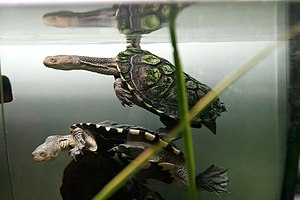Turn-Neck Turtles
This article has been registered in the quality assurance biology for improvement due to formal or content-related deficiencies . This is done in order to bring the quality of the biology articles to an acceptable level. Please help improve this article! Articles that are not significantly improved can be deleted if necessary.
Read the more detailed information in the minimum requirements for biology articles .
| Turn-Neck Turtles | ||||||||||||
|---|---|---|---|---|---|---|---|---|---|---|---|---|

Smooth-backed snake-necked turtle ( Chelodina longicollis ) |
||||||||||||
| Systematics | ||||||||||||
|
||||||||||||
| Scientific name | ||||||||||||
| Pleurodira | ||||||||||||
| Cope , 1864 |
The turn-neck turtles (Pleurodira) place their heads laterally under the shell when they retract in a horizontal S-shaped movement. They represent the subordination of the turtles , which is younger compared to the Halsberger turtles , because they only formed in the chalk .
With them, the cervical vertebrae have strong spinous and lateral processes for the attachment of the neck muscles. Your pelvis has grown together with the shell.
All turn-neck turtles live in inland waters in the southern hemisphere, in Africa , Madagascar , Australia , New Guinea and South America .
Including fossil core group representatives, the subordination is narrower or broader depending on the author, in the former case the pan group is called Pan-Pleurodira and the crown group is called Pleurodira and in the latter case the crown group, which contains the recent Pleurodira, is called Eupleurodira.
Familys
- Snake neck turtles (Chelidae)
- Pelomedus tortoises (Pelomedusidae)
- Podocnemididae
literature
- V. Storch, U. Welsch: Special Zoology. Part 2: vertebrates or skulls. 6th edition. Spectrum Akademischer Verlag Heidelberg / Berlin 2004, ISBN 3-8274-1112-2 .
See also: Systematics of the turtles